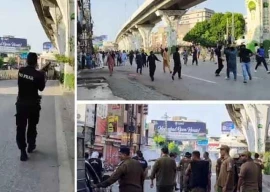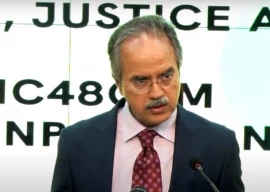
The 40-minute documentary on 18th century Sufi poet Hameed Baba opens with one of his poems, ‘Khat pa makh da sanam raghly’ sung by renowned Afghan singer Nashenas. The narrative follows shortly – Pashto poet Abaseen Yousafzai briefly walks the audience through the city of Peshawar.
The biopic on Baba or Abdul Hameed Mohmand is the brainchild of the late Arif Shafi, a print and broadcast journalist who died in April in a suicide blast on Arbab Road, which left eight dead and nearly 50 wounded.
‘The works and life of Hameed Baba’ was completed within Shafi’s lifetime but has not been officially released as yet. Shafi felt strongly about the potentially irreplaceable loss of history as Hameed Baba recedes in the collective consciousness of the region – notably absent from most school curricula and the media.
Through interviews of scholars and residents of Baba’s native village Mashokhel, the documentary attempts to rediscover the life of a great poet.
Mashokhel locals narrate the folklore associated with Hameed Baba; tales handed down in the village from generation to generation.
His grave lies close to Mashokhel, and is in a noticeable state of disrepair, contextualised in the documentary by the lack of interest in maintaining his narrative posthumously.
Time and again, the issue at the core of the biopic resurfaces – the lack of research on Hameed Baba, a Sufi scholar considered an intellectual worth migrating to study under, someone who saw the world without rose-coloured glasses and rearranged it in a literary framework.
The short film attempts to showcase how Hameed Baba’s contemporaries gained much fame and respect, enough to prompt the local government to create shrines, and for academics to write books on them. However, Hameed Baba, who shared a timeline with renowned Rahman Baba, and was also highly-respected by the latter, never garnered such timeless approval.
Oddly, acknowledgement for Hameed Baba’s skills came from foreign quarters. Linguist Henry George Raverty was part of the British Indian army and went through considerable lengths to study the Pashto language and its finer writers. In his book ‘Selections from the Poetry of the Afghans, from the 16th to the 19th Century’ (1862), Raverty described Hameed Baba as the cynical poet of the Afghans and the Sheikh Saadi of Pashto – exalting both his thematic and literary strengths.
Behind the biopic
“If Shafi was alive, the documentary would have been released by now in Afghanistan, as here in (Pakistan) neither the public nor the government have any interest in watching such things,” argued Latifullah Daudzai, the producer of the documentary.
“In reality, it is Afghanistan who honours Hameed Baba,” he said, adding in 1973, it was the Afghan king Zahir Shah who visited Hameed Baba’s grave.
“We have to remember our elders, who have rendered great sacrifices, and shaped and maintained a separate Pukhtun identity,” noted Dawoodzai. Especially in current times, he added, when there is a greater need to take inspiration from the teachings of history. “Sadly, it’s not even part of our academic curriculum.”
According to Daudzai, Arif Shafi completed the recording of the documentary in the short span of three months under very tight financial conditions. He would canvas remote areas on his motorbike to interview the right people.
“Most of the people who worked on this project or provided assistance did so as volunteers,” said the producer, explaining everyone involved was driven by the desire to highlight the Sufi poet. “Even Abaseen Yousafzai gave his time as a narrator without demanding any money.”
“This is not a commercial venture; that is why people were less interested in being involved, they knew they would not make money out of it,” shared Daudzai. “We hope, against all odds, to make the next documentary on Pir Roshan, the Pukhtun warrior-poet from South Waziristan.”
Published in The Express Tribune, July 18th, 2013.
COMMENTS (1)
Comments are moderated and generally will be posted if they are on-topic and not abusive.
For more information, please see our Comments FAQ

















G ood story , well done, Pir Rokhan -Bayazid Ansari was not a warrior poet . Latifullah should know that he was a great Sufi saint and pioneer of first Pashto book 'Khairul Bayan' written in embellished style cannot be called poetry but prose in four language -Persian, Hindi ( early Urdu) Arabic and Pashto .